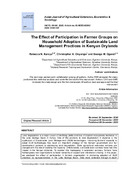| dc.contributor.author | Karaya, Rebecca N. | |
| dc.contributor.author | Onyango, Christopher A. | |
| dc.contributor.author | Ogendi, George M. | |
| dc.date.accessioned | 2021-02-03T08:33:16Z | |
| dc.date.available | 2021-02-03T08:33:16Z | |
| dc.date.issued | 2020-12 | |
| dc.identifier.citation | Asian Journal of Agricultural Extension, Economics & Sociology, 38(11): 66-80, 2020; Article no.AJAEES.63392 | en_US |
| dc.identifier.issn | 2320-7027 | |
| dc.identifier.uri | https://karuspace.karu.ac.ke/handle/20.500.12092/2472 | |
| dc.description | DOI: 10.9734/AJAEES/2020/v38i1130454 | en_US |
| dc.description.abstract | Land degradation is a major cause of declining yields and loss of dryland ecosystems resilience in the Lake Baringo Basin in Kenya. One of the solutions to land degradation in drylands is the application of Sustainable Land Management (SLM) technologies. Improving farmers’ capacity to adopt SLM technologies has been an important strategy of the Kenyan government and her development partners to addressing land degradation. State agricultural extension services are charged with the role of building this capacity. Unfortunately, such extension services have had little impact in the Kenyan drylands. To counter this inadequacy in extension services, farmers have formed grass-root organisations to foster networks of support and information sharing. In this paper, we analysed the effect of participation in farmers organisation in promoting adoption of SLM
practices by agropastoralists in the Lake Baringo Basin. Data were collected through in-depth household interviews with 150 farmers, 79 of them group members and 71 non-group members. Level of knowledge, sources of information and challenges of SLM adoption were studied. The study revealed significant and positive association between group participation and adoption of SLM practices at X2 (3, N=150=63.209, P=0.000). Additionally, group partnering with development agencies like Non-Governmental Organisations (NGOs) and government departments was reported to have significant influence on household adoption of SLM practices at X2 (3, N=79=13.147, P=0.004). The results indicated that farmer groups can effectively be used to leverage farmers' adoption of SLM innovations and potentially improve household income and food security in the
Kenyan drylands. We recommended organizational and resource capacity building for farmer groups to promote their effectiveness in provision of resources and services to their members. In addition, government research and extension agencies and academia should consider forming collaborations with farmer groups in generation of SLM technologies that are suited to the farmers location and prevailing context. | en_US |
| dc.language.iso | en | en_US |
| dc.publisher | Asian Journal of Agricultural Extension, Economics & Sociology | en_US |
| dc.subject | Words farmer groups | en_US |
| dc.subject | participation | en_US |
| dc.subject | collective action | en_US |
| dc.subject | sustainable land management | en_US |
| dc.subject | agricultural extension | en_US |
| dc.subject | drylands | en_US |
| dc.title | The Effect of Participation in Farmer Groups on Household Adoption of Sustainable Land Management Practices in Kenyan Drylands | en_US |
| dc.type | Article | en_US |
